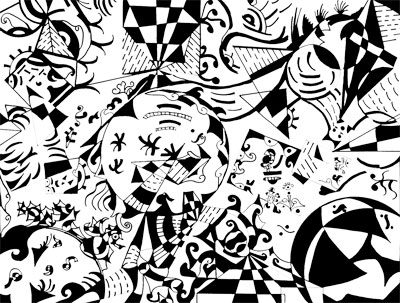All Nonfiction
- Bullying
- Books
- Academic
- Author Interviews
- Celebrity interviews
- College Articles
- College Essays
- Educator of the Year
- Heroes
- Interviews
- Memoir
- Personal Experience
- Sports
- Travel & Culture
All Opinions
- Bullying
- Current Events / Politics
- Discrimination
- Drugs / Alcohol / Smoking
- Entertainment / Celebrities
- Environment
- Love / Relationships
- Movies / Music / TV
- Pop Culture / Trends
- School / College
- Social Issues / Civics
- Spirituality / Religion
- Sports / Hobbies
All Hot Topics
- Bullying
- Community Service
- Environment
- Health
- Letters to the Editor
- Pride & Prejudice
- What Matters
- Back
Summer Guide
- Program Links
- Program Reviews
- Back
College Guide
- College Links
- College Reviews
- College Essays
- College Articles
- Back
An Exercise in Thinking
The chessboard is a perfectly divided eight by eight battlefield. The white and black sides stand apart, mirroring each other, evenly matched. Queens, kings, knights, rooks, and bishops stare each other down behind the parapet of pawns. They wait for the game to begin, to start their elegant dance toward oblivion. There is an art in the way they move; they glide across the board, strengthening and weakening a fluid mosaic of black and white. There is magic in the weight of the pieces, as you hold your destiny and direct its course.
I began playing chess at a young age for enjoyment. During rainy April days in the P.S. 183 cafeteria I would sit with my group of friends, huddled like moths above a campfire, around a cheap chess set. We didn’t care about strategies or “the book” (the correctly analyzed set of moves for chess openings) we only based ourselves off of each other. We challenged each other to get better, fighting each battle to the bitter end. In those days, chess was not about the competition so much as it was about the clash. It did not matter who won or lost, only that we played.
We grew older and started to play tournaments, official tournaments with trophies and honors. My first tournament was at the Hunter school, an old armory. The experience was miserable. There was no natural light in the building, and I lost every single one of my rounds. My very first round, I was checkmated in three moves, the fool’s mate. From the first time I entered a tournament, I slowly began to hate chess. The stress that I had associated with it outweighed the pleasures that I had felt while playing chess in the cafeteria of my elementary school.
For a long time after that, I stopped playing chess, altogether. The sense of community and friendship that I had treasured from the game seemed lost. What use was competition, when all that I wanted from the game was insight? Competitive chess disgusted me, because it forsook the spontaneity that I treasured. The haphazard style that I played with my friends was ineffective against the calculations of tournament opponents. Third-Grader-Sicilian-Defense-Knight-to-B6-variation would not be sufficient, no— I had no place in the world of chess.
The game had become too real; it had encroached upon the stresses of my actual life. The goals of chess, to win individual games, had become the goals of my life in a way I neither anticipated nor desired. Once chess became real for me, once the goals of chess became part of the goals of my life, I could no longer enjoy the game. Each battle was worth more than just pride or ingenuity; it was worth a score that could be tabulated and quantified. The codification of beauty that I witnessed at Hunter ran counter to everything that I believed chess should be, so I abandoned the game.
But this state of total abstinence could not last long with a game like chess. I started playing again, little by little, with my friends from my high school. This game was different than the one I had played in elementary school. This game was intelligent, bold and tactical. I was playing with the people who had not given up on chess as I had but went on to compete at the state and regional level. The people whom I played with at Hopkins were accomplished chess players, but I enjoyed playing with them, and they enjoyed playing with me.
MD was my polar opposite on the chessboard. He was a brilliant tactician, a student of the book, fearsome opponent. I played him a dozen times a week on average, from which I took one victory or none. In terms of chess pieces, he was a queen: the strongest piece on the board, but one that adheres to the rules, moving only in straight-line paths across the battlefield.
I began to love the game again, when I began playing him. Not only would we play games, but we would also analyze situations or games that we had already played. I felt that MD, more than the other competitors that I had faced at tournaments in elementary school, wanted to play the game because of the beauty of it; the call of victory meant little (perhaps because he had won so often). We did not play touch move; we beat each other by winning earnestly, not by gaining from petty mistakes.
We laid our lives on the chessboard, where casualty after casualty falls to the opposing side. Sacrifices were made, gambles taken, desperate tactics with glorious results. The air is bound by a powerful pressure — passion hangs heavy in the silence. Two players consecrate holy ground; two rivals try their wits. Two friends are sworn enemies until one declares “Checkmate.”

Similar Articles
JOIN THE DISCUSSION
This article has 0 comments.
